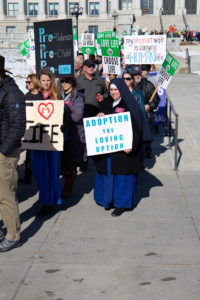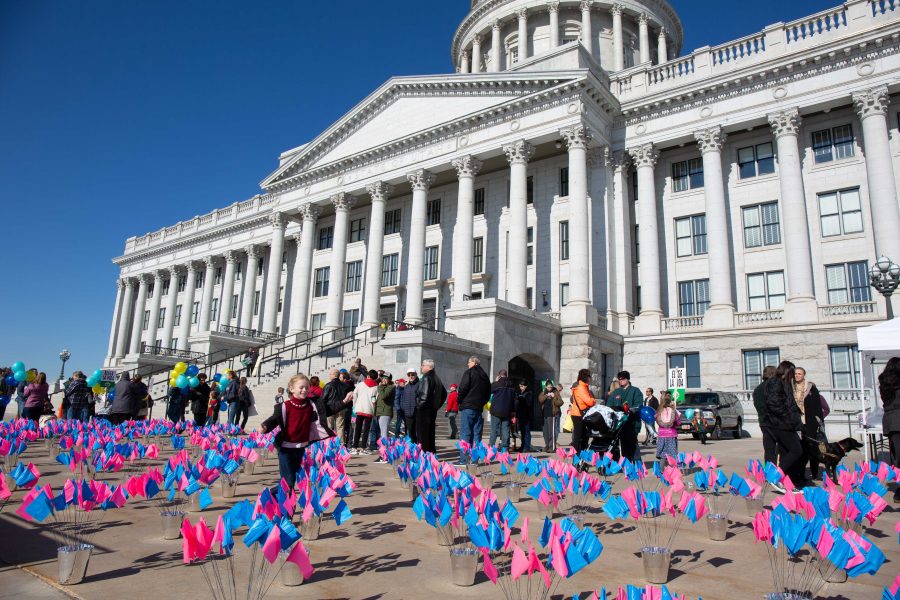The Utah Museum of Fine Arts (UMFA) organized an open lecture and discussion on women’s reproductive rights in coordination with Salt Lake Public Library on Thursday evening, Jan. 24. The event was the latest in a series of sessions under the “Art. Community. Museum. Education.” initiative (ACME) founded in 2016.
ACME sessions are a series of public meet-ups where participants can imagine and articulate new models of education and community engagement through hands-on activities and dialogue. Bi-monthly sessions are held to address issues relevant to Utah.
“We have a unique ability to address the issues we’re facing today, and we have the privilege of bringing in really great people to engage in this process,” said Jorge Rojas, director of Education and Engagement at UMFA.
The session, titled “Reproductive (In)Justice: Working Towards Collective Liberation,” filled the lecture hall at the Marmalade Branch of Salt Lake Public Library with pro-choice, LGBTQ and women’s rights activists to hear from a pre-selected panel. Roxanna Curiel, the moderator of the event, opened the session with an introduction to her work in activism for reproductive rights. She opened with comments concerning the passing of the 46th anniversary of Roe v. Wade, the landmark U.S. Supreme Court case that ruled laws denying women access to abortion as unconstitutional.
“There still needs to be more work done to give the right to have children, to not have children and to raise those children in a healthy and safe environment,” Curiel said. “That should not be taken as radical— it should be a given. It’s about interrogating power. The legal right of Roe v. Wade is amazing, but in many ways its ability is limited. State-level policies like mandatory wait periods, insurance coverage exclusions, parent involvement laws and abortion provider targeting limit women the means to find access to safe abortions.”

Activism and tension surrounding the anniversary of Roe v. Wade have made a strong impact elsewhere in Utah politics as well. The March for Life Utah, held on Jan. 26, brought hundreds of pro-life activists in protest of the estimated 3,200 abortions that occurred in Utah as of 2018. Leaders of the event called for voters to contact state and federal level legislators to express their views. More direct calls to action were to protest outside of Planned Parenthood.
“The folks at Planned Parenthood do not like us very much,” said Mary Taylor, president of Pro-Life Utah and organizer of the march.
Utah law currently allows exception-free abortions up to 20-22 weeks. Curiel cited that the gestation period for fetus viability is at 24 weeks. Abortion law is anticipated to be a major topic of community discussion as the Utah legislature convened on Jan. 28. Expected bill proposals include H.B. 136, which would ban exception-free abortions after 15 weeks gestation. If passed, it would be one of the strictest regulations in the nation. It would likely face lawsuits from pro-choice entities such as Planned Parenthood Utah. An escalation of legal disputes creates further speculation on the fate of Roe v. Wade, as a prolonged appellate process may lead to a revised decision by the U.S. Supreme Court regarding the constitutionality of abortion law.
Another controversial bill will also soon be introduced in Utah. Rep. Merrill Nelson, R-Grantsville, is looking to pass a bill to narrowly identify the sex of newborns while also banning future amendments to birth certificates. Equality Utah, an LGBTQ rights group, has stated that the bill is an attempt to erase transgender Utahns.
On campus, the U’s student body has divisions among them on the topic of abortion, just as any other population anywhere else in the nation would. The role that the Associated Students of the University of Utah (ASUU) had in the Women’s March on Utah in January has faced criticism from conservative students. One includes the project “Campus Reform,” a college news website that, in their own words, “exposes bias and abuse on the nation’s college campuses.” Regarding the Women’s March, the website criticized student body president Connor Morgan for holding a Planned Parenthood sign at the rally, calling it an “inappropriate” use of student government resources.
The perception of Planned Parenthood and its role in Utah politics continues to be one of the more divisive issues in modern politics. The hope ACME has for its sessions, regardless of the attendees or speakers, is that they will achieve an open dialogue regarding these issues. The remainder of “Reproductive (In)Justice” focused heavily on child-rearing resources for minorities, as well as basic community outreach to learn and teach about sexuality, families and social justice.


